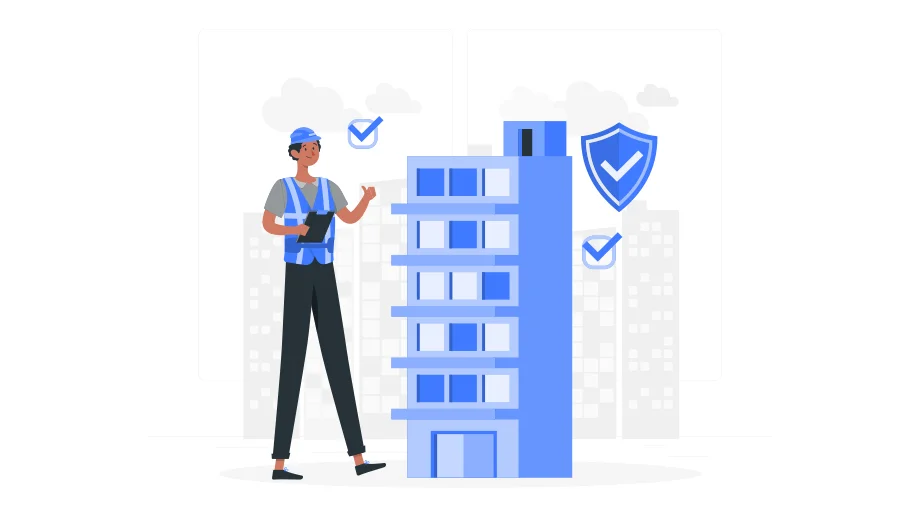Facility Management companies are facing new challenges with the increasing demand for sustainable buildings. Facility management businesses have always been inspecting and checking buildings to ensure compliance with certain standards or checklists.
But now, the burden on Facility management companies is going up both in terms of the rigorousness and frequency of the building inspections as well as the safety of their field inspectors. As they now have to do more with the same resources, they must adopt technology to help them cope with this added challenge.
Building owners and tenants are increasingly looking for buildings that have achieved WELL and LEED certification. While LEED certification has been around since 2014, David Hules puts it best in his article “How to prepare your facility for LEED certification”, where he goes through the substantial benefits of LEED certification. LEED-certified structures maximize occupant health and productivity, use fewer resources, decrease lifecycle costs, and reduce waste and negative environmental impacts.
Today, we spend 90% of our time in the buildings where we work, live, exercise, shop, and socialize. The WELL building standard is the first certification focusing on the health of people in these buildings.
As Mike Ward succinctly puts it in his piece on the differences between LEED and WELL, LEED is designed to focus on buildings while WELL is designed to focus on people. There is some overlap between the two but WELL certification is a performance-based system for measuring and certifying features of the built environment that impact human health and well-being, while LEED certification is a rating system that measures the environmental performance of a building.
The WELL standard addresses categories such as Air, Water, Nourishment, Light, Fitness, Comfort, and Mind and has recommendations for each. The blog “What is WELL certification?” gives you more information on the WELL standard.
As facility management companies adopt standards like WELL and LEED or develop their own facilities checklist for building, there is a massive operational challenge on how to go about implementing these standards in a way that does not require additional manpower or expense. To achieve these certifications, Facilities Management companies need to adhere to strict guidelines and checklists.
In this blog, we will explore the facilities checklist for buildings, and how mobile inspection apps can help Facilities Management companies stay on top of these new challenges.
Facilities Checklist for building:
The WELL and LEED certification checklists for facilities management businesses are comprehensive and cover a wide range of areas. Here are some of the key areas that need to be addressed to achieve these certifications:
Site Selection: The site of the building should be chosen based on its proximity to public transportation, green spaces, and other amenities that promote wellness and sustainability.
Water Efficiency: The building should be designed to conserve water, and low-flow fixtures should be used. The use of rainwater harvesting systems should also be considered.
Energy Efficiency: The building should be designed to minimize energy consumption, and renewable energy sources should be utilized whenever possible.
Indoor Air Quality: The building should be designed to promote good indoor air quality, and materials with low levels of volatile organic compounds (VOCs) should be used.
Thermal Comfort: The building should be designed to provide thermal comfort to occupants, and temperature and humidity should be controlled.
Acoustics: The building should be designed to minimize noise pollution, and sound-absorbing materials should be used.
Lighting: The building should be designed to maximize natural light, and energy-efficient lighting systems should be used.
Materials: The building should be constructed with materials that are sustainable, recyclable, and non-toxic.
Waste Management: The building should be designed to minimize waste generation, and a comprehensive waste management plan should be in place.
Innovation: Innovative strategies that promote sustainability, wellness, and environmental responsibility should be implemented.
Achieving WELL and LEED certification is not an easy task, but by adhering to these facility checklists, Facilities Management companies can ensure that their buildings meet the highest standards of sustainability, wellness, and environmental responsibility.
Challenges Faced by facility management companies
Facilities management companies face several challenges when it comes to achieving WELL and LEED certification for their buildings. Here are some of the common challenges that these companies may encounter:
Cost: Achieving WELL and LEED certification can be costly, and facilities management companies may need to invest a significant amount of money to upgrade their buildings and systems to meet the certification requirements.
Complexity: The certification process can be complex, with a lot of documentation and reporting required. Facilities management companies may need to work with multiple stakeholders and contractors to meet the requirements.
Time: The certification process can be time-consuming, and companies may need to plan well in advance to meet the deadlines.
Lack of knowledge: WELL and LEED certifications are relatively new concepts, and companies may lack the knowledge and expertise needed to navigate the certification process.
Resistance to change: Upgrading systems and processes to meet certification requirements may require a change in the way companies operate, and some employees may resist these changes.
Maintenance: Once certification is achieved, facilities management businesses must maintain the building’s performance at a high level to maintain certification. This can require additional resources and ongoing effort.
Lone worker safety: Another concern for businesses as they want to make sure that field technicians are operating in a safe environment and can report back in real-time any emergencies or alerts based on what they see in the field.
Why a Manual process is inefficient
Facilities Management companies face several challenges when preparing building facilities inspection checklists manually. Here are some of the key challenges:
Time-Consuming: Preparing inspection checklists manually can be a time-consuming process. This is particularly true for large buildings or complex facilities.
Error-Prone: When preparing inspection checklists manually, there is a higher likelihood of errors or omissions. This can lead to safety issues, compliance violations, or other problems.
Difficulty in Collaboration: Manually preparing inspection checklists can make it difficult for teams to collaborate effectively. This is particularly true for teams that are geographically dispersed.
Lack of Consistency: Manually preparing inspection checklists can lead to inconsistencies in the inspection process. This can make it difficult to compare results across different facilities or buildings.
Limited Data Analysis: When preparing facility inspection checklists manually, it can be difficult to analyze data and identify trends or patterns. This can limit the ability of Facilities Management companies to make informed decisions.
Inefficient Record-Keeping: Manually preparing inspection checklists can lead to inefficient record-keeping practices. This can make it difficult to track changes over time or to access historical data when needed.
Overall, preparing building facilities inspection checklists manually can be a challenging and inefficient process for Facilities Management companies. Adopting technology solutions such as commercial building inspection software, property inspection checklist app, or mobile inspection app can help to streamline the inspection process, reduce errors, and improve collaboration and data analysis.
Benefits of mobile inspection app in Facility management
Mobile inspection apps can bring significant benefits to Facility Management businesses. Here are some of the ways that a mobile inspection app can help accelerate the process with automation, conditional logic, and validation:
Streamlined Inspections: Mobile inspection apps can automate the inspection process, making it faster and more efficient. Inspectors can quickly and easily complete field inspections using their mobile devices, without the need for paper-based checklists.
Improved Accuracy: These apps can reduce the likelihood of errors or omissions in the inspection process. Built-in logic and automated workflows can ensure that all necessary data is captured and that inspections are completed consistently.
Real-Time Data: Mobile inspection apps can provide real-time data and insights, allowing Facilities Management businesses to monitor the progress of inspections and identify issues as they arise.
Improved Collaboration: These apps can facilitate collaboration between inspectors, managers, and other stakeholders. Teams can share data, photos, and other information in real-time, improving communication and decision-making.
Cost Savings: Mobile inspection apps can help reduce the costs associated with manual inspections. By automating the process and reducing errors, businesses can save time and money.
Faster Response Times: Mobile inspection software can help Facilities Management businesses respond more quickly to issues or incidents. Real-time data and automated workflows can ensure that issues are identified and addressed promptly.
How allGeo can help?
Solutions like allGeo’s mobile forms enable setting up checklists on mobile devices that field inspectors can use on-site on their smartphones to perform complex inspections with rich data collection including signatures, photos, and QR / barcodes.
The mobile forms solution can streamline the inspection process and improve the accuracy and consistency of data collection, while also providing real-time visibility into the status of inspections and any issues that need to be addressed.
See an example of an Electrical Inspection Checklist here.
Using forms can reduce human errors, there is no paperwork required, you can stay compliant with regulatory requirements, and geotag all field activities to create a system of record right from customer job sites.
You can also create reports (PDF, XLS, etc) and route them to appropriate departments and customers in real-time. Furthermore, you can trigger alerts based on form field data entries and even integrate with your CRM/ERP systems using API.
This kind of comprehensive capability can enable field operations to be implemented, automated, and managed to reduce costs and give businesses the tools to establish control over their field activities.
Facilities management businesses require a scalable system that adheres to compliance standards, supports remote work, maintains data security, and ensures uninterrupted business operations as they adopt new standards or add to their existing checklists. Such a system can grow with their needs and provide a seamless transition to more sustainable and efficient practices. As facilities management companies take on more responsibilities, they can leverage technology like allGeo to assist them in this transformation.
Conclusion:
The demand for sustainable buildings has brought new challenges to Facilities Management businesses. Achieving WELL and LEED certifications has become an important factor for building owners and tenants.
Facilities Management businesses must adhere to strict guidelines and checklists that cover a wide range of areas, such as site selection, water and energy efficiency, indoor air quality, waste management, and innovation. Adopting technology based solutions such as commercial building inspection software, property inspection checklist app, or mobile inspection app can help these businesses streamline the inspection process, reduce errors, and improve collaboration and data analysis. By meeting these new challenges, businesses can ensure effective management of facilities and meet the demands of an increasingly competitive industry.
About allGeo
allGeo helps SMBs and Enterprise businesses better manage mobile workforce and field operations with tools such as real-time location, GPS time and attendance, geofence visit logs, Lone worker safety, Mobile forms, and more! All the tools can be highly customized to fit each use case. The platform features a powerful rules engine and integrates with popular back-end CRM, HRMS, and Payroll systems to automate day-to-day operations.
allGeo serves customers from a wide range of the industry including field service management, trade services, emergency responders, sales reps, transportation & logistics, oil & gas, and home health care providers. These customers do report improvement in productivity and savings in payroll.



